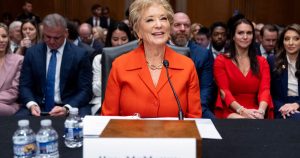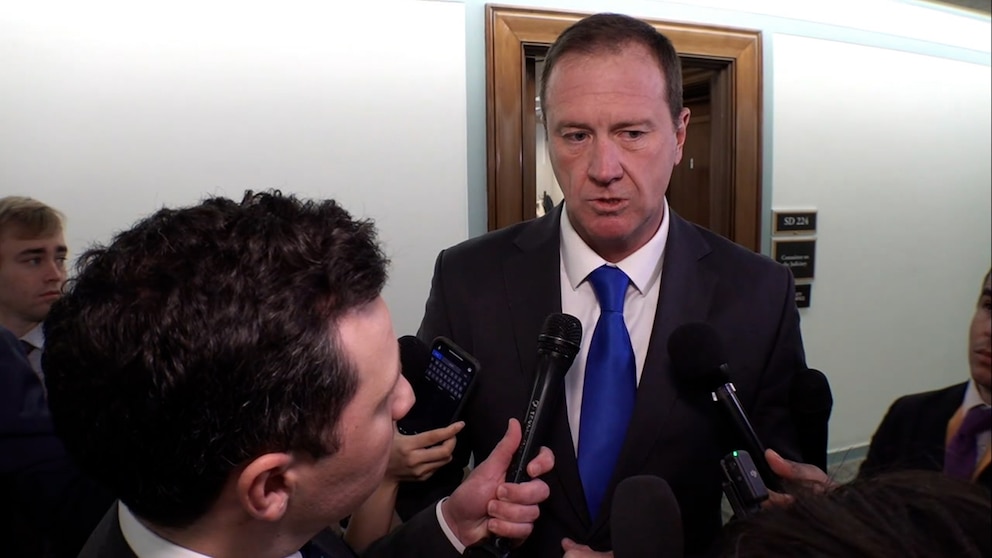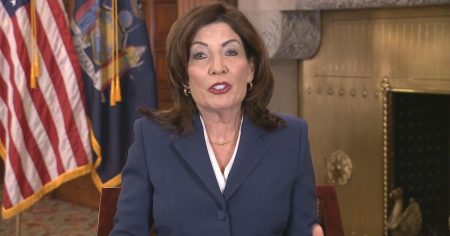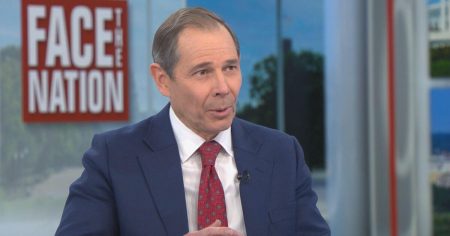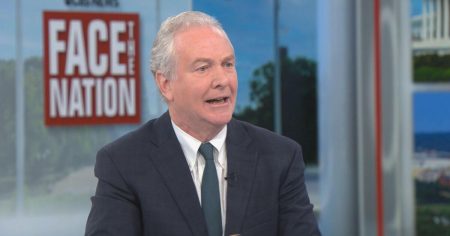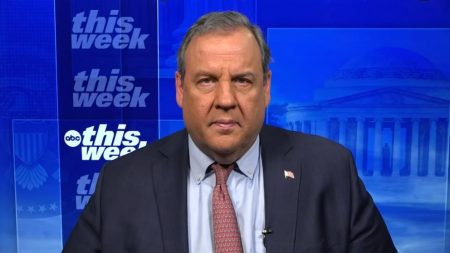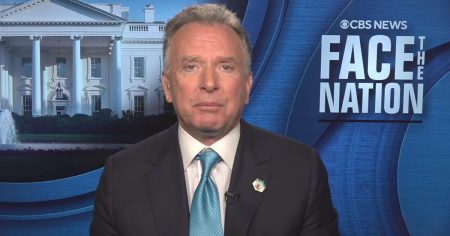The Delicate Balance of Politics: GOP Senators and Trump’s Ukraine Comments
In the ever-evolving landscape of U.S. politics, a recent development has brought into focus the complex dynamics between Republican lawmakers and former President Donald Trump. Specifically, GOP senators have found themselves in a precarious position when asked to comment on Trump’s controversial remarks about the war in Ukraine. Trump, known for his unfiltered rhetoric, recently referred to Ukrainian President Volodymyr Zelenskyy as a "dictator," a label that sparked immediate backlash from many quarters. However, instead of directly criticizing Trump, Republican senators have opted for a different approach, choosing to distance themselves from his inflammatory remarks while simultaneously voicing strong condemnation of Russian President Vladimir Putin’s actions in the ongoing conflict.
This nuanced strategy reflects the broader political climate within the Republican Party, where loyalty to Trump remains a significant factor despite growing divisions. By avoiding direct criticism of Trump, GOP senators are balancing their desire to maintain party unity with the need to engage on a critical foreign policy issue. This calculated approach highlights the challenges faced by Republican lawmakers in navigating Trump’s polarizing influence, even as they seek to project a unified stance against Russia’s aggression in Ukraine.
The Shifting Sands of Republican Foreign Policy
The Republican Party’s stance on the Ukraine conflict has undergone a notable shift in recent years. Historically, the GOP has been associated with a strong, hawkish foreign policy, advocating for robust military support and a firm stance against authoritarian regimes. However, the influence of Donald Trump has introduced a degree of unpredictability into this equation. Trump’s rhetoric on Ukraine has often been inconsistent, oscillating between expressions of support for Kyiv and criticisms of U.S. aid to the embattled nation. His recent characterization of Zelenskyy as a dictator has further muddied the waters, leaving Republican lawmakers to grapple with how to respond.
In this context, the decision by GOP senators to sidestep direct criticism of Trump while denouncing Putin’s actions is a calculated move. It allows them to maintain a degree of distance from Trump’s more controversial statements without explicitly breaking with him, a strategy that may help preserve party cohesion. At the same time, by focusing their criticism on Putin, Republican senators are able to align themselves with the broader U.S. foreign policy consensus, which strongly opposes Russia’s invasion of Ukraine. This dual approach underscores the delicate balancing act that GOP lawmakers must perform in navigating the complexities of Trump’s influence.
Theoretical Underpinnings of the GOP’s Strategy
The restrained response of GOP senators to Trump’s remarks can be understood through the lens of several theoretical frameworks. First, the concept of party unity remains a powerful motivator, particularly as the 2024 presidential election approaches. Republican lawmakers may be reluctant to publicly criticize Trump out of fear of alienating his loyal base, which remains a vocal and influential segment of the party. This dynamic is reinforced by Trump’s continued dominance of the Republican political landscape, despite his polarizing effect on the broader electorate.
Second, the decision to avoid criticizing Trump directly may be driven by a strategic calculation to focus on issues where there is greater consensus within the party. By concentrating their fire on Putin, GOP senators can rally behind a cause that enjoys bipartisan support, thereby minimizing internal divisions. This approach also allows them to frame their opposition to Russia’s actions in Ukraine as a defense of democratic values, a narrative that resonates with many American voters.
Third, the muted response to Trump’s comments may reflect a broader shift in how the Republican Party engages with foreign policy. While traditional GOP orthodoxy has emphasized a strong U.S. role in international affairs, Trump’s "America First" ideology has introduced a more isolationist and transactional perspective. This shift has created tensions within the party, as some lawmakers seek to reconcile Trump’s populist rhetoric with the need to address pressing global challenges like the Ukraine conflict.
The Implications for Ukraine, Russia, and the United States
The evolving stance of GOP senators on Ukraine carries significant implications for the ongoing conflict and the broader geopolitical landscape. For Ukraine, the tepid criticism of Trump’s remarks on Zelenskyy may raise concerns about the future of U.S. support, which has been instrumental in Kyiv’s resistance against Russian aggression. Should Trump or another Republican candidate win the White House in 2024, there may be increased pressure to reassess U.S. aid to Ukraine, potentially undermining the country’s ability to defend itself.
For Russia, the GOP’s criticism of Putin’s actions, even as they avoid directly confronting Trump’s rhetoric, suggests that bipartisan opposition to Moscow’s aggression remains strong in Washington. This continuity in U.S. foreign policy could bolster Ukraine’s position on the battlefield and deter further Russian escalation. At the same time, the ambivalence within the Republican Party toward Trump’s remarks may embolden Putin, who has sought to exploit divisions in the West to weaken support for Ukraine.
From the U.S. perspective, the dynamics within the Republican Party highlight the challenges of maintaining a coherent and bipartisan foreign policy in an increasingly polarized political environment. The ability of GOP senators to navigate these complexities will play a critical role in shaping the trajectory of U.S. involvement in Ukraine and the broader strategic competition with Russia.
Broader Perspectives on the GOP’s Balancing Act
The Republican Party’s balancing act on Ukraine is not occurring in a vacuum; it reflects broader trends in American politics and society. The ascendance of Trump within the GOP has brought about a reorientation of the party’s priorities, with issues like immigration, trade, and cultural identity often taking precedence over traditional foreign policy concerns. This shift has created tensions not only within the Republican Party but also between the U.S. and its allies, many of whom view Trump’s influence with skepticism.
Moreover, the GOP’s approach to Ukraine is likely influenced by the evolving media landscape and the fragmented nature of modern political discourse. In an era dominated by social media and 24-hour news cycles, political leaders must navigate an environment where even minor comments can spark widespread controversy. This dynamic may encourage GOP senators to adopt a cautious approach, avoiding direct confrontation with Trump while seeking to maintain a reputation as responsible stewards of foreign policy.
At the same time, public opinion plays a significant role in shaping the GOP’s strategy. While a substantial portion of the Republican base remains loyal to Trump, there are also indications of growing fatigue with his divisive rhetoric and tactics. By avoiding direct criticism of Trump, GOP senators may be seeking to preserve their relationship with his base while also appealing to independent and moderate voters who are critical of Trump’s behavior. This strategic balancing act reflects the broader challenges of coalition-building in modern American politics.
Conclusion: Navigating the Uncertain Future
The recent comments by GOP senators on Trump’s remarks about Ukraine offer a snapshot of the complex and often contentious political landscape in the United States. As the 2024 elections approach, the Republican Party finds itself at a crossroads, torn between the enduring influence of Donald Trump and the need to address pressing global challenges. By avoiding direct criticism of Trump while denouncing Putin’s actions, GOP senators are attempting to navigate this treacherous terrain, balancing the need for party unity with the imperative of engaging in meaningful foreign policy debates.
However, this approach is not without risks. The nuanced stance adopted by Republican lawmakers may fail to satisfy either side of the political divide, potentially alienating both Trump loyalists and those who demand a more forceful response to his rhetoric. Moreover, the long-term implications for Ukraine and the broader U.S.-Russia relationship remain uncertain, as the trajectory of American foreign policy continues to be shaped by the volatile dynamics of domestic politics.
In conclusion, the GOP’s response to Trump’s comments on Ukraine underscores the complexities of modern political leadership, where the demands of party loyalty, electoral strategy, and global responsibility often collide. As the situation in Ukraine continues to evolve, the ability of Republican lawmakers to navigate these challenges will play a crucial role in shaping the future of U.S. foreign policy and the Republican Party itself.
